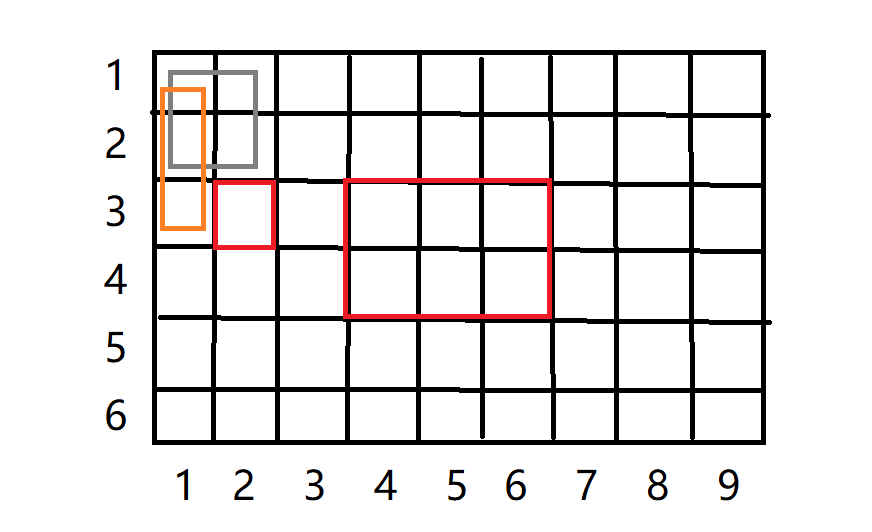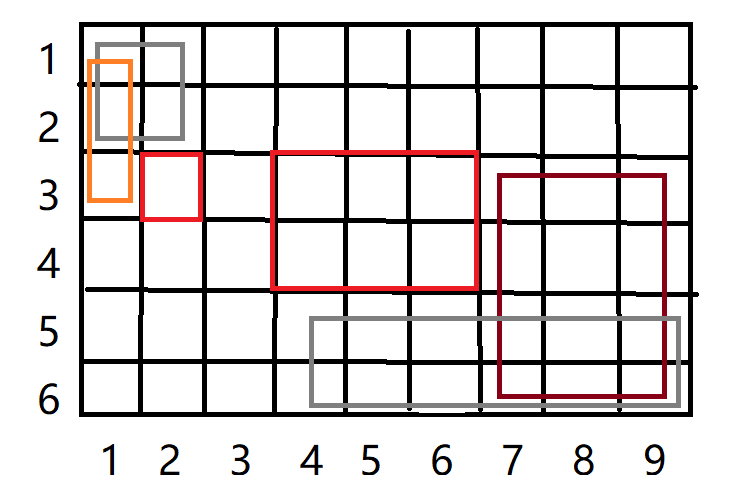Prefix sum is an important preprocessing tool in the algorithm.
Okay, I can't make it up anymore, it seems I don't have any [doge]
Differential operations, which can be said to be the inverse of the sum of prefixes, are often used together with the prefix to solve some interval problems.
Recently, I also encountered a lot of difference problems, so I am ready to summarize one article. Here, we will focus on the prefixes and differences between one and two dimensions. Say nothing more.
Prefix and;
In one dimension, there's nothing to say.
Let's look at two dimensions:

Let's first look at the prefix and requirements for a point [2,3]:
As you can see, if we want to, we'll add the sum of all the points from [1,1] to [2,3];
The point is how we add it;
When we calculate the sum of [2,3] prefixes, [2,2] and [1,3] must have been calculated;
So what we can see is that the prefix sums of [2,2] and [1,3] are contained within [2,3] and contain [1,2] repeatedly
So: (s: prefix and array, a: original array)


Okay, I'm sure you've learned it.
Let's see how prefixes and intervals are needed. (For example, let's calculate the interval prefix of the Red Square and [6,4], [4,3])
We find the same, so cut off the extra chops;
But we found that the extra part [3,2] was cut twice during the cutting process, so we have to add this part in the end.
So
 ;
;
Okay, then we can do the whole thing;
Territory Selection - Lo Valley
You don't have to explain this [doge]
#include<bits/stdc++.h>
using namespace std;
const int N = 1010;
typedef long long LL;
int n,m,c;
int a[N][N];
LL s[N][N];
int main()
{
cin>>n>>m>>c;
for(int i =1 ;i <= n;i ++)
for(int j =1 ;j <=m ;j ++)
cin>>a[i][j];
for(int i=1;i<=n;i++)
for(int j=1;j<=m;j++)
s[i][j] = s[i-1][j] + s[i][j-1]- s[i-1][j-1] + a[i][j];
LL res = -1e8;
int x,y;
for(int i =1 ;i <= n -c + 1 ;i ++)
for(int j = 1 ;j <= m -c + 1 ;j ++)
{
int x1,y1,x2,y2;
x1= i;
y1 = j;
x2 = i + c -1;
y2 = j + c -1;
LL mx = s[x2][y2]- s[x1-1][y2] - s[x2][y1-1] + s[x1-1][y1-1];
if(mx > res)
{
res = mx;
x = i,y = j;
}
}
cout<<x<<" "<<y<<endl;
return 0;
}Difference;
Reverse the process; a[i] -= a[i-1];
So if we want to get the original array, we just need a[i] += a[i-1] (prefix and);
As mentioned above, the most common use of difference is to maintain an interval so that each operation contributes the same amount to that interval.
The saying is: add a value to the number in this area;

Look directly at the picture;
How do we want to add 1 to [3,5]?
If we consider the values of prefix and, prefix and the first number in the middle, we will make a contribution to all subsequent numbers. Then we add 1 to 3, which will make a contribution to all subsequent numbers 1, but I just want to add 5, that is, we don't want to add the contribution to 6, so we can subtract 1 from 6. This contribution does not contribute to subsequent numbers from 6 onwards.

We do the same;
We want to add 1 to [4,3]-- [4,6];
Adding 1 to [4,3] will contribute to all points in the lower right corner of that point;
So we subtract contributions from other parts;
We add -1 to [4,5] so that the gray box is not contributed by [4,3] plus 1; The addition of -1 to [7,3] results in the dark red box not being contributed by [4,3] plus 1;
However, there is overlap, and we subtract a little more, so we add one on [7,5] to add the extra subtraction back;
Let's talk about the whole difference.
Submarine High-Speed Rail-Lough Valley
#include<bits/stdc++.h>
using namespace std;
const int N = 100010;
typedef long long LL;
LL n,m;
queue<int> p;
LL a[N],b[N],c[N];
LL s[N];
LL res;
int main()
{
scanf("%d%d",&n,&m);
for(int i =1;i <= m;i ++)
{
int c;
scanf("%d",&c);
p.push(c);
}
for(int i =1;i <= n - 1 ;i ++) scanf("%d%d%d",&a[i],&b[i],&c[i]);
int st,ed;
st = p.front(),p.pop();
while(!p.empty())
{
ed = p.front(), p.pop();
if(st > ed)
{
s[ed] ++;
s[st] --;
}
else
{
s[st] ++;
s[ed] --;
}
st = ed;
}
for(int i =1 ;i <= n - 1 ;i ++) s[i] += s[i - 1];
for(int i =1 ;i <= n-1 ; i ++)
{
if(s[i] * a[i] > s[i]* b[i] + c[i]) res += s[i]* b[i] + c[i];
else res += s[i] * a[i];
}
printf("%lld\n",res);
return 0;
} Close your work;